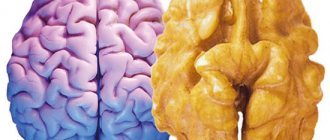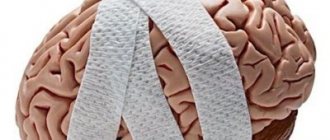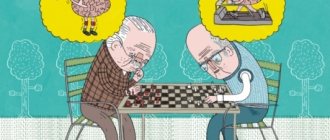A child’s poor performance at school and reluctance to attend classes is a common problem in many families. The reason for this may be the heavy workload of school programs and the inability of teachers to present information in an interesting way. You can increase concentration, memory and perseverance using various methods.
Eidetics is the science of memory development. It helps a person perceive information more effectively. The basic principle of eidetics is the following: any information can be presented in the form of pictures-images. This method of learning is used not just to improve memory, it makes the learning process a game. At the same time, children will strive to gain new knowledge and will not want to shy away from doing homework. Eidetics for children is a technique suitable for schoolchildren of any age.
How to improve a teenager's memory
Poor memory is often cited as one of the reasons for a teenager’s poor performance at school. Indeed, a teenager’s memory is often upset for various reasons. But is it really that scary? Perhaps there is a way to improve a teenager’s memory, thereby increasing his academic performance?
Situations are quite possible when a teenager has great difficulty remembering formulas, dates of historical events, rules of grammar or lines of poems and at the same time knows perfectly well the year and history of the creation of the group “Led Zeppelin”, the year of release of the first album and the composition of “The Doors” or the names all Manchester United players, the technical characteristics of a Lamborghini, or remembers the ASCII code table by heart. Is it possible to say in this case that the teenager has a bad memory?
What does "bad memory" mean?
It has long been noticed that after unsuccessful attempts to remember the topic, ending with a bad grade at the blackboard, the topic of the lesson suddenly pops up in the student’s memory of its own accord after just one comforting word and a gentle look from a pretty classmate. “I know it! I was just confused at the board..."
So, in fact, does the concept of “bad memory” even exist? Of course, if this is not due to bad heredity, disease or lack of thyroid hormones...
Perhaps it is appropriate to draw some parallel here with the world of computing, where there is also the concept of “memory”. So, the computer also has memory, and it can be operational (short-term) and permanent. When the computer is running, the necessary data is loaded into RAM from permanent memory, which is physically located on the hard drive, and then various operations are performed with it.
Accessing data in RAM is much faster than accessing the same data stored on a hard drive or external storage devices, and access to disks depends on their speed and the quality of connections.
What happens if the connection between the hard drive and the computer circuitry is broken? Access to data on the disk will deteriorate or be completely interrupted.
The same thing happens with a teenager’s memory, which actually stores all the information about everything that happened to him over a certain period. It’s just that, for some reason, the data from the teenager’s “hard drive” does not enter his “RAM” or it is difficult to find it. How to strengthen the “connection”?
Learning with passion: the right path
So, a teenager who does not remember formulas and rules, but can remember the names of the players of his favorite football team on the fly, cannot in any way have a bad memory. It’s just that this young man or young lady is characterized by emotionality, they may have a lyrical and even romantic mindset, so their subconscious simply rejects dry facts.
And, on the contrary, there are many cases from life when C grade students became excellent students, when a “dry” school subject began to be taught by another teacher, leading the lesson emotionally and very interestingly, using interesting facts from the history of the subject and about outstanding scientists, so much so that the former A C student in literature becomes a brilliant philologist.
Emotions - positive and negative
The learning of a lesson by “problem” teenagers occurs much faster and more firmly if new information is presented in such a way that the teenager sees that the teacher himself is very passionate about his subject, loves it and is an expert and a good specialist.
It will help assimilation, and, consequently, improve memory, if the teacher cares about such a teenager and with satisfaction and joy draws the attention of other children, as well as his parents, to this.
The positive emotions experienced by the student will be a strong motivating factor for successful studies. On the contrary, negative emotions (the teacher scolds, parents are unhappy, classmates laugh) can cause self-doubt, isolation, reluctance to learn and bad behavior.
Article tags:
improve memory
|
|
Poor memory in a child: reasons
It is worth noting that many children, or rather their parents, do not know about the child’s poor memory before he enters first grade. After all, it is at this moment that the number of tasks increases, so it is very difficult for the child to concentrate and perform at his best. There are several main reasons why a child may suffer from poor memory.
First grader
Causes of poor memory in a child:
Wrong daily routine. The point is to activate all the brain centers, make memorization easier, there is no need to put pressure on the child and load him with constant cramming. Try to do loads by alternating. That is, alternate physical as well as mental activities. Accordingly, the best option would be to study for about an hour, then go for a walk or some kind of section where the child can do physical exercises, running, or strength training. This is the optimal routine
Pay attention to your baby's bedtime and wake time. Very often, poor memory can be caused by the fact that the child does not fall asleep well or goes to bed late
Accordingly, he does not have enough sleep, because of this he cannot concentrate and work productively during the day.
Insufficient amounts of vitamins and minerals. The fact is that some vitamins, as well as microelements, help improve memory. Accordingly, their lack can provoke poor memorization. In this case, it is necessary to periodically give the child vitamins, and also review his diet in the direction of increasing the amount of healthy foods. Give preference to fresh fruits, vegetables, fish and meat. Don't forget dairy products. You should not give your child a variety of fast food and sweets. Although two sweets won't do anything bad. After all, fast carbohydrates in the form of sugar are an excellent source of brain nutrition. They will come in handy when the child is a little tired and will help turn the brain centers into work.
Insufficient memory training. That is, the child is pedagogically neglected. Most often this occurs in children with poor speech. After all, the development of speech really indicates how well the child’s memory develops. If a child speaks poorly, swallows words, it is difficult for him to express his thoughts, he thinks for a long time about what he wants to say. Most likely there are some problems with memorization and memory.
Another cause of poor memory in a child may be neurological disorders. Most often this is associated with difficult childbirth, cesarean, and prematurity of the child. Most often, such children, immediately after birth, are registered with a neurologist and given medications that stimulate brain activity. Accordingly, if you did not have any special problems during childbirth, but the child suffers from poor memory and all activities do not produce any results, it makes sense to consult a neurologist. A truly experienced specialist can prescribe medications that stimulate brain function and help your child learn.
At school
Teenage attention
Attention is a person’s ability to concentrate his cognitive processes on a specific object in order to study it comprehensively. [1]
One of the main features of a child’s development at 10-12 years old is that, unlike younger schoolchildren, he can control his attention. The level of concentration of a teenager on any type of activity is sometimes selective. A simple example: a child is very attentive and focused when he is doing his favorite hobby or playing with friends, but in school during class he may be constantly distracted because he finds the activity boring.
It is inattention that often “slows down” the mental development of a child 13-15 years old and older, and also becomes the cause of poor discipline and performance at school. But according to many psychologists, this problem is rather social in nature, it is not determined by any disturbances in the development of cognitive processes - the child is always more attentive to those objects that are interesting to him. The task of parents is to help the teenager develop the ability to concentrate. An equally important function is assumed by teachers at school - the presentation of educational material should be interesting and appropriate to the age group of children.
Developing attention in a teenager is extremely important. This teaches him [2]:
- be focused on a specific activity for a long time;
- select from the list of tasks the most significant for yourself;
- perform tasks consisting of many operations;
- quickly “switch” to performing other tasks if external circumstances require it.
Herbal infusions
In order to improve your memory, it is not necessary to immediately resort to drug treatment. There are quite a few remedies in folk medicine that have both preventive and therapeutic effects.
Clover tincture
In order to prepare this infusion, you will need half a liter jar of clover heads. Add ½ liter of vodka to them, cover with a lid and hide in a dark place. Leave for two weeks, stirring it daily. After the designated time, pour the resulting liquid into a dark container. Take 1 tablespoon in the afternoon for three weeks. Then take the same break and repeat the procedure. The course of treatment should be 3 months.
Red rowan bark
Add a glass of boiling water to one tablespoon of bark and keep on low heat for 10 minutes. Then pour everything into a thermos and leave to steep for 6 hours. You need to take it 3 times a day for one month. This course should be repeated twice a year, preferably not in the summer. The decoction will not only improve memory, but also saturate the body with vitamins and strengthen the immune system.
In her program, Elena Malysheva will talk about herbs and spices to improve memory.
Herbal collection
Before you start preparing the infusion, mix the dry herbs: raspberry leaves - 6 teaspoons, lingonberries - 6 teaspoons, oregano - 2 teaspoons and bergenia - 8 teaspoons. Then from the resulting mixture, take one tablespoon and fill the collection with ½ liters of boiled water. Keep on fire for 10 minutes, then cover the dish and leave for 2 hours. You need to drink this mixture twice a day for at least 3 weeks. The course is held 2 times a year.
Sage and mint
Take 2 teaspoons each of dry mint and sage. Place the herbs in a thermos and fill them with 500 ml of boiled water. Before you start drinking the infusion, you need to strain it. Take 50 grams four times a day 30 minutes before meals.
"Grandma's" recipe
To prepare the infusion, you will need about five table pine needles, which will need to be chopped. Add onion peels and rose hips (two tablespoons each). Pour the resulting mixture with a liter of cold water and boil for about 10 minutes. Leave the infusion overnight in a warm place. The course lasts two weeks. Every day, take 1 tablespoon 5 times.
Improving memory and brain function
Try to focus on one thing at a time. If you are sitting at a lecture, do not be distracted from the person who is giving the lecture, do not talk to friends, even if you have not seen them for a long time, do not correspond on the phone, do not be distracted anywhere. In the evening, in a calm atmosphere or on the way home, try to remember and recall the entire lecture down to the smallest detail, remember the teacher’s gestures or walking, what he talked about, the clothes he was wearing
Proper nutrition is very important for brain function. Try to avoid snacking on the go and don’t eat fast food - it’s bad for your brain.
Include the following foods in your proper diet: vegetables, fruits, honey, dried fruits, dairy products, nuts, herbs. Don't overexert your brain. If you feel tired, there is no need to overexert yourself, give your body a chance to rest. A tired person perceives information poorly or does not perceive it at all. Load your brain only with useful information. Try to discard unnecessary and unnecessary information, don’t get hung up on it, you need to be able to filter the information that comes to you. Unnecessary information only clogs your brain. Don't forget about walks in the fresh air. Active walks in the fresh air, preferably outside the city in nature, are necessary for the proper functioning of the brain; these can be various sports or just active recreation. Active games in the fresh air are the key to the proper functioning of your brain and body as a whole. Develop memory and attention with specially designed exercises to improve memory and attention for adults and children.
How to develop memory and improve memory?
There is only one conclusion: a schoolchild’s memory has many possibilities. All that remains is to use them correctly.
Here are some tips:
Alternative ways to remember.
For example, mnemonics is the creation of associative images for better memorization of objects.
Training in information structuring.
Such as creating “smart maps” or others.
Proper nutrition and a healthy lifestyle.
This is the key to brain health and development.
Increased motivation and awareness.
Need to remember something? Start by understanding “why?”
Hobby.
It is necessary for the teenager to have something to do besides studying. This is a change in activity and leading type of thinking. Sports, creative activities, alternative education - everything where you have to think differently.
Poor memory in a child: types of medications and their effects
Initially, you need to try to improve the child’s memory through training. There are entire complexes for this. The easiest option is to learn poems with children. This method is best suited for children who go to kindergarten. By the way, this will be good training for further preparation for school. By learning poetry well, a child will quickly remember the alphabet and learn to read.
However, if such methods do not give results, and you have not moved forward, the baby still has a very difficult time remembering poetry, and it takes several hours to learn a small quatrain, then it makes sense to turn to medications. It is worth noting that there are a huge number of means for improving memory; their action can be based on different substances. The safest and most harmless are special vitamin complexes for memory. They contain a large amount of minerals and trace elements, as well as vitamins that promote memory.
On learning
Types of medications for poor memory in a child:
- Sedatives and antidepressants will help improve memory. You may ask, how do these medications help improve memory? The fact is that scientists have found that people who are depressed actually suffer from memory impairment. This condition negatively affects memory and deteriorates the functioning of the brain and all systems in the body as a whole. Accordingly, if a child suffers from depression, or there is bullying or harassment at school, then, of course, it is best to give the child antidepressants and eliminate the irritating factor. In addition, such drugs may act slightly differently. Nowadays, herbal infusions, as well as special herbal components, are given for this purpose. Many of them can actually significantly improve memory.
- Substances that affect the functioning of the brain, improving its activity. Most often, such drugs are prescribed for traumatic brain injuries, strokes, and coronary artery disease. They are often given during recovery from a concussion. However, these drugs are popular with a neurologist if the child’s poor memory is due to some kind of disease. In particular, this may be increased intracranial pressure, birth trauma, as well as some organic brain damage. The child may have been injured and hit his head hard. In this case, these drugs will indeed help improve blood circulation in the brain, which will improve the child’s memory.
- It is worth noting that medications that stimulate brain function are sold only with a doctor's prescription. That is, they are not available for free sale. But they are not recommended to be given to children who do not suffer from neurological illnesses or diseases. However, if a child has any indications for use, then it is imperative to contact a neurologist. However, this most often happens in exceptional cases, when the child has really serious problems with memorization, and he cannot remember the quatrain within two hours. Indeed, in this case it is necessary to sound the alarm. We recommend that your child, who is absolutely healthy, use herbal preparations.
Homework
Taking medications
It is possible to achieve a positive result in the development of memory in adolescents through the use of medications. In most cases, you can do without them, but to enhance the effect of training, it is recommended to use the safest medications.
The most popular means:
- “Glycine” – increases performance, calms the nervous system, normalizes brain function;
- "Piracetam" - stimulates metabolic processes inside the brain, improves the assimilation of new material, helps to remember even uninteresting information;
- "Phenibut" - improves cerebral circulation, increases performance, and provides a teenager with strong memory.
Additionally you can take:
- "Biotredin";
- "Aminalon";
- "Pantogam";
- "Tenoten";
- "Noben";
- "Bilobil";
- "Intellan";
- "Fezam."
It will also be useful to purchase vitamin complexes. They have a positive effect on brain function and strengthen human memory. Vitamins B and C have a good effect.
The specifics of taking certain medications should be checked with your doctor.
Tips on how to improve your memorization processes
To improve the child’s memory and brain function, it is important to follow the general recommendations of doctors and psychologists, first of all this concerns the regime and lifestyle. Bad habits, poor nutrition, and a sedentary lifestyle worsen the health of a child’s still developing body and increase the likelihood of developing diseases.
Of course, this cannot but affect his performance, because in order to cope with academic workloads and preparation for exams, he simply needs to feel good.
There are many different techniques to develop the memory of teenagers.
Some of them are aimed at training the perception of information by ear, others at developing visual memory. You can practice on your own; educational websites contain many examples of exercises aimed at improving brain activity. However, in order to sufficiently develop memory and attentiveness, it is necessary to train them consistently, systematically. It is not always possible to cope with this task on your own, but only in this case, activities that improve memory will help the child more easily master the material of the school curriculum.
Various centers for additional education for children and adolescents come to the rescue. They host group classes that are aimed at improving memory. When choosing such an educational institution, you need to pay attention to the methods by which training is conducted. You should not give preference to those centers that promise to achieve improved results in a short time.
Carefully choose those educational institutions where memory development classes are conducted according to time-tested programs. They will help the teenage intellect, which is still developing, to improve its abilities so that the child subsequently studies and works well.
Methods for developing memory in children
A large number of different techniques have been developed to help develop cognitive function and promote better memorization of information. Two methods received the most positive feedback and recommendations: developed by Glen Doman and the Montessori method.
Glen Doman Method
The method was developed for working with young children with memory impairments. Later it was adapted so that it became possible to work with healthy children. Classes should start at an early age. It is important to rejoice in all the child’s successes, support him and praise him. It is necessary to exercise in a comfortable environment, and complete the lesson before the onset of severe fatigue. The material should be given sequentially, starting with simple lessons and moving on to more difficult ones only when the child is ready for it.
Classes must be regular. It is forbidden to test knowledge, arrange quizzes and tests: this will create unnecessary stress for the child. It is impossible to study when the child is tired, in a bad mood, or for some other reason does not want to continue the lesson.
Montessori method
This method is based on play activities, during which children can improve attentiveness, memory, logical thinking, and imagination. Parents can only play the role of observer; It is prohibited to teach a child anything against his or her wishes. Children choose the desired type of activity independently. The child can independently determine the duration of any lesson. It is important to create conditions in which he will be comfortable studying.
How to keep your memory in order
Eat right
Short-term and long-term memories are stored in different parts of the brain. Memory works smoothly if nothing interferes with the transition of short-term memory to long-term memory - this process is called consolidation. The hippocampus, the area of the brain responsible for orientation and transferring short-term memory to long-term memory, “feeds” on glucose. Its high concentration in the blood when consuming refined sugar and sweet drinks exhausts the hippocampus and inhibits its functions. But a complete refusal of sweets, even fruits, will lead to weakening of memory.
Conclusion: reasonable consumption is important. Green tea contains the antioxidant EGCG - epigallocatechin gallate, which promotes the generation of brain cells and helps prevent degenerative age-related diseases
A study in Japan found that elderly Japanese who drank more than 2 cups of green tea per day had a 50 percent lower risk of memory and attention problems than those who drank less than 2 cups or drank other beverages.
Green tea contains the antioxidant EGCG - epigallocatechin gallate, which promotes the generation of brain cells and helps prevent degenerative age-related diseases. A study in Japan found that older Japanese people who drank more than 2 cups of green tea per day had a 50 percent lower risk of memory and attention problems than those who drank less than 2 cups or drank other beverages.
Magnesium, found in nuts, dark green leafy vegetables and legumes, bananas, figs and fish, improves memory. Experiments in mice have shown that increasing magnesium in the brain enhances the functions of various forms of learning and memory, promoting cellular plasticity. I personally confirm that it works. A portion of figs before an exam once saved me and helped me remember the answer to a question on a seemingly forgotten topic.
Green tea with dark chocolate - a snack for excellent memory
Set up a regime
Healthy sleep plays a key role in maintaining and improving memory, and even one night of sleep deprivation leads to loss of brain cells. It is during rest that the so-called consolidation of memory occurs - the transfer of short-term memories into long-term ones.
By the way, this is why it is important to get a good night’s sleep the night before the exam, especially if the preparation process has been delayed until the last minute. You need at least 8 hours of sleep every night
Based on the recommendations of the National Sleep Foundation, only after the age of 64 a person needs less time to sleep:
Get rid of stress
Short-term stress can be good for memory, so there is a chance to remember the essence of a long-forgotten thesis at an important interview. But a long-term excess of cortisol, the stress hormone, literally reduces the brain in size and impairs memory
Exposure to the hormone disrupts connections between neurons and changes the size of the brain's prefrontal cortex, which is responsible for concentration and decision-making. Research shows that this effect is most noticeable in women and people over 40.
Maintain a healthy lifestyle
Excess weight leads to problems with the heart and blood vessels, and the blood supplies the brain with nutrients worse, impairing memory. On the contrary, exercise and physical activity can lead to the growth and development of neurons, which has beneficial effects on memory and overall brain function. Activities that require coordination of vision with body movements and social interaction work especially well: table tennis, badminton and dancing.
Take your vitamins
Preferably after passing tests and under the supervision of doctors. First and foremost, you need magnesium and B vitamins.
You can buy vitamin supplements without a prescription at any pharmacy.
Recharge your brain
Like a computer, you sometimes need a reboot to get rid of unnecessary “files” stuck in memory. Try, for example, taking a shower with your eyes closed: the sensations will be more interesting, the smell of the shower gel will be more pleasant, and your brain will receive a useful impulse to reboot.
Activate new parts of the brain by moving the fork from your right hand to your left, or vice versa if you are left-handed. Try a new activity: horse riding, a new foreign language or a new knitting technique can be a great workout for the brain, creating new neural connections, improving coordination and ultimately strengthening memory.
Have a rest
Periodic breaks from activity help you remember information better. The main thing is not to switch to a new activity, but to let your thoughts wander aimlessly for 10–15 minutes.
If your health is good, memory can be improved using the same principles as fitness: periodic exertion, nutrient supply and regular rest.
Expanding your memorization capabilities
We offer effective ways to develop your thinking processes at home and completely free of charge.
Feelings
The method of co-feelings allows you to build memorable associations. To do this, you need to learn to connect all five senses. For example, create associations for the word “airplane.” How do you see it? What do you hear? How do you feel after the touch? What taste do you feel? What's the smell?
In this way, you can learn to more acutely perceive and remember new data more reliably. It is difficult to forget something that caused the activity of several senses at once.
Training attention
Attention is something without which it is impossible to achieve maximum memory. In the era of information overload, it is simply necessary to be able to focus on the main thing
The following exercise is suitable for those who are looking for how to train memory and attention for one minute a day
Set your stopwatch to 60 seconds. Make marks in the figures as shown in the example, strictly one by one. Repeat the exercise every day until you can cross out everything correctly and meet the deadline. If you wish, you can increase the difficulty level and increase the number of figures. Print as many copies as you like and make the actions automatic.
Memorizing texts using pictograms
Pictograms surround us everywhere. These include smartphone icons, road signs, and brand logos.
Pictograms are an excellent means of memorizing any text that needs to be stored in memory verbatim, no matter if it’s a verse, a quote or a definition of a term.
A clear example of the use of this technique is in the book “100% Memory” by E. Dodonova.
So, in the first picture we see an excerpt from E. Yevtushenko’s poem “The Third Snow”.
This is how the author of the book depicted these lines using pictograms.
Thus, every person, young and old, can learn to quickly memorize by drawing pictograms as their own imagination dictates.
Mind maps
This method is also called “mind maps”, “mind maps” or “mind maps”. As with pictograms, they must be drawn. But it's worth it: mind maps have a long-term effect if you need to completely remember a book, organize a business project, or sketch out a vacation plan.
Step-by-step instructions for drawing mental maps look like this.
- In the center we depict an image of a task, problem or area of knowledge.
- We move the main sections of the map to the sides in the form of thick branches (we sign them to the minimum and number them).
- Using keywords, colors and icons, we reveal details on thin branches.
Let us remind you: memory exercises will give results only if repeated many times.
Classification of types of memory
Human memory is not fully understood. But now we can say with confidence how its mechanism works:
- Memorization;
- Preservation;
- Reproduction upon recognition;
- Forgetting.
There are two types of memorizing information: voluntary and involuntary. Voluntary memorization is special. This includes cramming poetry, historical dates, and mathematical formulas. In this case, motivation plays a big role. Involuntary memory is quite unpredictable. The child remembers what he saw, heard, touched. Some information ends up in the long-term memory section, while other information is destroyed because it is not needed and the child does not use it. When memorizing, the material is determined by a special structure of the brain - engrams.
There are two types of information storage: dynamic and static. Dynamic storage refers to short-term memory, static storage refers to long-term memory. The latter type is important for a child’s learning. Because he needs to remember important material in class, then return to it in exams, and supplement it when doing homework.
Forgetting unnecessary information is just as important as remembering important information. Forgetting is a procedure for destroying neural connections. The baby’s psyche needs it to avoid overload.
As mental processes become tense, memory is divided into: emotional, motor, figurative and verbal-logical. The first type of memory that a child begins to develop is motor memory. With its help, the baby learns to control his body. Next comes emotional memory. Thanks to her, the baby begins to recognize his parents by face and voice. The baby will not smile at strangers. Figurative memory appears even later. This includes memorizing taste, touch, and images. In addition, associations are formed, with the help of which the memorization process is easier. Verbal-logical memory is the last to develop. She helps the child formulate his thoughts and turn them into words.
Children's memory has its own characteristics. For example, girls develop visual and long-term memory faster and better. And for boys - motor skills. In addition, boys remember numbers better.
Exercise Cellular Toking
This strange, at first glance, exercise works like this:
- increases the speed of thinking;
- shows how hard your memory can stretch.
The task is as follows - you need to name all the objects that you see in the room in front of you. For example, a table, a chair, a monitor, a flower, a sofa, a carpet. Objects can be named with descriptive characteristics and without specifics. It is interesting to do the exercise with an observer in the room. He will evaluate the speed of your work, after what time you will be “blown away.” Over time, the pauses between words will increase, you will get confused in words and help yourself with gestures. This exercise is a great way to boost your brain activity.
After regularly performing this exercise, neurons begin to work not at half capacity, but at full strength. This kind of brain training will eliminate absent-mindedness and forgetfulness, and increase your response in stressful situations.
Games
In addition to exercises, there are also various games that help improve children's memory. As an example, there are several game forms that help develop the memorization process. This includes the following:
- A game of words and pictures - in this case you need to name several different words (10-15 pieces). Then you need to ask the child to repeat all the words spoken. This game will help develop verbal and logical memory. To improve visual memory, you can show your child several pictures, ask him to close his eyes, and then remove some of them. In the future, he must tell which images are missing.
- The game “guess the word” - in this case, the parent must guess a certain word, but not voice it. At this time, the child calls leading questions and thereby tries to find out what word was guessed. For example, questions may include: Is this item edible? What colour? What shape? etc.
- Game “Look and Name” - the parent asks the child to look carefully around and name all the objects he sees. For example, it might sound like this: “Name all the objects that are colored green.” Next, the child must look around, then close his eyes and from memory list all the green things that he managed to remember.
It is also worth noting that to improve memory, it is necessary to make family reading a tradition, during which you can read interesting fairy tales and stories to your child, and then retell in detail what you have read. This method of memory development also includes daily memorization of children's poems. Even if it is only 4 lines, it is important that the student memorizes them every day.
What is the volume of our memory
It seems that “short memory” and information instantly flying out of the head are the norm. But modern research proves that long-term human memory can hold 1 million GB. information. And that's a lot, a lot of space.
| Data store | Volume, GB. |
| 1 movie in excellent quality | 10,00 |
| Season 1 of the series in excellent quality | 100,00 |
| iPhone 7 | 256,00 |
| iCloud | 1000,00 |
| Computer hard drive | 2000,00 |
| Memory of 1 person | 1000000,00 |
| Internet traffic per second | 5000000000,00 |
Every person stores in memory not only facts, faces and numbers, but also functions: the ability to speak and move, sensory perception and expression of emotions.
Our memory does not adapt to new information conditions at all, decreasing in volume. We simply stopped training and using it, so it relaxed, like a muscle without a load. Yes, there are smartphones and services for remembering passwords, electronic phone books and encyclopedias in digital format. But there are definitely things in the world that you don't want to forget. This means you will have to make an effort.
After visiting New York, I actively photographed the views so that I would have something to “feed” pleasant memories
Sooner or later, the inability to remember useful information or remember important information in a timely manner begins to negatively affect productivity, work efficiency, pleasant communication and your overall peace of mind.
Human memory is larger than the most advanced computers, so it can definitely be improved
Method 9. Teach your child to strain his memory
The easiest way to develop memory is training . Sounds corny? Yes, but without regular exercise nothing will happen. And in our age of tablets, smartphones and the Internet, it is becoming increasingly difficult to strain your memory, because the easiest way is to look for something forgotten on the vastness of the World Wide Web. And children master these skills almost from the cradle.
Therefore, it is so important to teach a child that if he has forgotten something, let him first try to remember on his own, and only if nothing comes out within a few minutes, let him look in a dictionary or the Internet.
Also interesting: How to improve memory - simple recommendations from Eastern medicine
Necessary books: what to read for children from 10 to 13 years old
Life hacks for excellent memory
Use memory techniques to commit the information you need to memory:
Visualize. As you read a book, imagine the characters and setting. Mentally tie the name of a new acquaintance to his appearance. Masha is a tall brunette, Petya has a Spiderman tattoo on his neck. Describe the numbers in the phone number using simple images: 7 - poker, 2 - swan, 0 - donut.
Choose associations. Rhyme information to help you remember it better. Since childhood, I have known that “A bisector is a rat that runs around corners and divides them in half.” After school, I never had to halve a corner, but the information remained in my brain forever.
Organize your information. Clean up your mail and create separate folders for important recipients. When making a shopping list, break it down into categories: drinks, food, household chemicals. Decide on a place for important household items - a key holder, glasses on the bedside table, a remote control for the TV.
A simple key holder makes life much easier and saves time in panicky searches for keys before going out.
Organize important things. This method was once known as the “Cicero technique” or the “Roman room method,” but the famous series about Sherlock Holmes forever cemented the name “memory palace” in the public consciousness. It’s simple: in the imagination you create a room, or a house, a road, or even a magical forest. Things, events or concepts that need to be remembered are associated with certain elements of this space and objects in it. For example, a friend’s birthday is a balloon, a monthly loan payment is a bottomless pit. After this, it is enough to imagine this room or mentally walk along the road, remembering the associated information. By the way, if, when remembering your tasks for the week, you mentally imagine the entries on a page of a diary or even in a school diary, you are already using this technique.
By mentally imagining a diary page, you can quickly navigate the days of the week and plan things for the future or remember the past
Tricks and tricks do not impair the efficiency of memory, just as a short and fast path to the goal does not impair the quality of the road. You simply make your task easier and relieve stress by putting things in order in your head and life.
Memory formation from 3 to 6 years
Parents need to know how to develop memory in children. During this period of time there is a productive development of attention. The baby effectively and easily learns important material for him, small poems. He tries to set the task himself and achieves it. This is a great age to improve tactile memory and start learning foreign languages. So how can you improve memory performance in a 6-year-old child?
Offer games that develop memory. For example, put various objects on the countertop, tell your son or daughter that he must remember the order and quantity of them, and then rearrange them and remove something completely. At this time, the child closes his eyes, and after your movements he opens them and tries to guess what has changed. Start learning words of a foreign language by matching them with various images and words of your native language.











